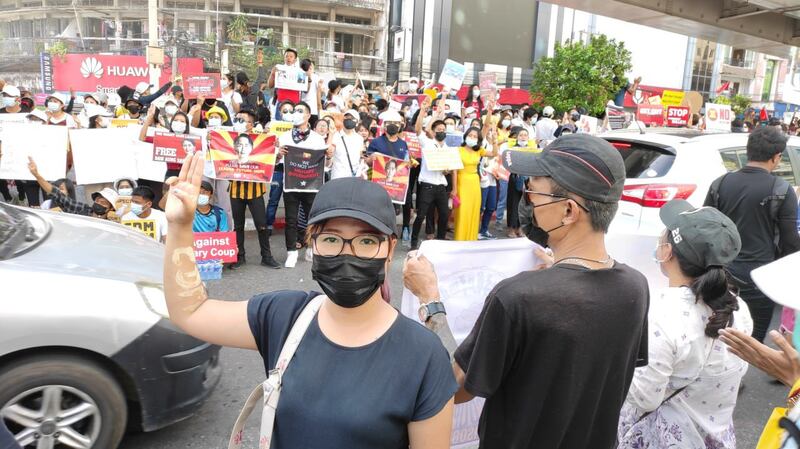A Myanmar trade union leader has fled from the surveillance of the military after release from more than two years in prison, to a region controlled by forces opposed to the junta, traumatized but unbowed and determined to fight on, she told Radio Free Asia.
Khine Thinzar Aye, who joined the Myanmar trade movement at the age of 19, was arrested in April 2022 during a strike against the military regime that took power in 2021. After a military truck hit a taxi she was in, soldiers arrested her and two other Confederation of Trade Unions Myanmar members. The union has 65,000 members nationwide.
As head of the union’s communications department, the now 29-year-old says she was subjected to intense questioning because of her position in the organization. During interrogations, Khine Thinzar Aye was told to kneel on the ground while soldiers beat her and forced her to confess to protesting in exchange for 30,000 kyat (US$11).
After being moved to the Shwepyithar Interrogation Center, she was checked for life-threatening injuries before being tortured for another seven days. Soldiers told her that they could kill her at any time, she said.
“When we arrived at the interrogation, we were blindfolded and handcuffed, then drunken men surrounded us and beat us and brutally cut our legs with knives,” Khine Thinzar Aye said, adding that they sexually assaulted her. “They put lit cigarettes on our faces and asked us to reveal the location of our trade union leaders’ homes.”
After a week of interrogation, she was sent to Yangon’s infamous Insein Prison to await trial. That December, she was sentenced to three years in prison with hard labor under the notorious provision 505A of the penal code, which criminalizes comment that can cause fear or spread fake news.
Insein Prison was so packed it was often impossible for prisoners to sleep, she said.
“It wasn’t humane. It was really crowded. One person was forced to stay in about a foot and half of space,” she said. “At the time when COVID was happening, if one person slept on their back, the other had to sleep on their side, taking turns.”
She was moved to the decrepit Thayarwady Prison in Bago Division for her last year.
"Plaster fell on us from the ceiling, the dormitories in our prison were more than 100 years old,” Khine Thinzar Aye said. “All the detainees were worried about when it would collapse.''
She was released in April, a few months early under an amnesty.
Unions under attack
Trade unions were among the groups that spearheaded protests that swept the country after the military seized power in early 2021, bringing a brutal end to a decade of reforms that had brought hope for change in a country ruled by generals for decades.
Nearly 1,000 trade union members have been arrested since the coup, another labor leader told RFA. However, because people are moved about the prison system so much, it is difficult to track the precise number.
“Thirty percent are released, some workers are sent to prison for life without parole,” said the second labor leader who declined to be identified in fear of reprisals. “Some union leaders, we can’t find them because we don't know what kind of prison they’re in or the place they were arrested. Some were shot on the street and died.”

Shortly after the coup, the junta banned 16 unions. Since then, workers have faced increasing challenges fighting for fair wages and freedom of association.
The military has become increasingly concerned about union funding, the second labor leader said, adding that they were constantly being questioned about connections to the shadow civilian National Unity Government and People’s Defense Force militias fighting the regime.
“Every evening, when the workers are going home from the factory, they check their phones,” she said. “If we like or follow some of the PDF or NUG channels, they beat us or arrest the workers.”
Returning to work
Khine Thinzar Aye said that during her interrogations, soldiers repeatedly asked her about involvement in “terrorist activities”, scrutinized the union budget and asked how it spent money.
She was released on April 26 traumatized by her experience.
“I had no peace of mind,” she said. “I knew I’d be constantly monitored, and I’d have to go to the police station and report.”
Escaping the city of Yangon, she fled to a region under the control of ethnic minority insurgents where she plans to stay and continue her work for the labor movement.
“Our country was on a path, moving toward democracy,” she said of the 10 years of tentative reform that the military ended with their coup.
“Our young people, our workers, all of us, will soon actively eradicate this dictatorship and its unjust oppression and illegal coup,” she said.
“We can do it if we’re united and push together.”
RFA Burmese contributed to this report. Edited by Taejun Kang.
